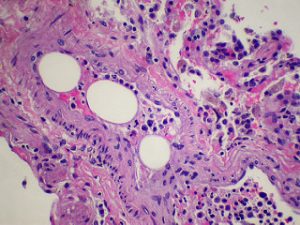Too Much Saturated Fat Still Causes Heart Disease

Fat embolism. Image from Yale Rosen
Yes, fat was disproportionately demonized in decades past, as nutritional pundits recommended fat-free diets. And while this took place, the grave health consequences of refined sugars were completely overlooked.
But this doesn’t mean that eating too much fat – especially saturated fats – is healthy all of a sudden. Many today are now saying that saturated fat is healthy, regardless of how much one consumes.
But consuming too much fat is still bad for you. This was proven out in a recent study published in the European Journal of Nutrition, from Italy’s University of Federico II.
In the study, 1,875 people between 50 and 75 years old were followed and tested for diet and metabolic markers. The subjects, who all had type 2 diabetes, were given blood testing along with food-frequency questionnaires.
The researchers found that when fat intake is increased, levels of cardiovascular markers related to heart disease also increase. When the subjects’ fat intake increased between 25 percent and 35 percent, their levels of the following markers went up:
• LDL-cholesterol
• Triglycerides
• HbA1c
• C-reactive protein (CRP)
CRP is a marker that illustrates increased levels of inflammation within the cardiovascular system. HbA1c levels indicate diabetes risk and glucose intolerance. Higher triglyceride levels have been linked with greater levels of heart attacks and stroke.
The same with LDL-cholesterol. Higher levels of LDL-cholesterol typically mean higher levels of lipid peroxidation – which means these fats are turning into free radicals.
Free radicals damage the blood vessel walls, which creates the formation of scars – plaque – and artery stiffness.
In this article
Complex carbohydrate consumption reduced heart disease
The researchers also found that when the subjects increased their consumption of complex carbohydrates, these unhealthy cardiovascular disease markers went down.
Increases in carbohydrates of between 45 and 60 percent resulted in significantly lower levels of triglycerides, lower HbA1c, and lower CRP levels.
Increased fiber intake over 15 grams per 1,000 calories per day was found to further reduce levels of HbA1c and CRP compared to those who consumed less fiber.
Refined sugars increase inflammation
As expected, the researchers also found that increasing intake of refined sugars increased levels of LDL-cholesterol, triglycerides and CRP levels. This last point is critical to refined sugar consumption in pops and candies.
This reveals one of the confounders – and likely at least one reason for some of the confusion about low carbohydrate diets. In the past, diets that were high in carbohydrates often included greater amounts of refined carbohydrates and refined sweeteners.
In summarizing their results, the researchers concluded:
“The data support the potential for reducing the intake of fat and added sugars, preferring complex, slowly absorbable, carbohydrates.”
Not the first study on saturated fats and heart disease
Dietary fat research is no spring chicken. Many studies over the past four decades, with thousands of people, have shown that diets with reduced levels of saturated fats and increased levels of complex carbohydrates have a beneficial effect on the heart.
This reality that diets that load up on saturated fat have a negative effect upon heart health was confirmed in a 2015 Cochrane Library study that included 59,000 people and 17 large randomized controlled trials. The 2015 meta-analysis from the UK’s Norwich Medical School found that when saturated fats are reduced, cardiovascular events – heart attacks and strokes – are reduced by 17 percent.
Some of the findings were not as clear, but what became clearer when the researchers subgrouped the results was that when saturated fat was replaced by polyunsaturated fats or monounsaturated fats, the relationship became clearer.
Some might recall another large 2015 review from Canada’s McMaster University. This study analyzed 12 cohort studies and found the association between saturated fat and deaths from heart diseases to be little or none. However, this study did use fewer studies, and these studies were observational. The UK review analyzed research that included controlled interventions.
The Canadian researchers confirmed this in their conclusion as they said, “but the evidence is heterogeneous with methodological limitations.”
This Canadian study also found an association between saturated fat and deaths from coronary heart disease. The research found an average of 15 percent increased death from heart disease. This study also found that trans fat intake was a significant cause for heart attack deaths – by as much 56 percent.
In other words, this Canadian study, as opposed to the UK study, did not test for reductions in saturated fats and what was replaced in the diet. This means that there could be other factors involved in the associations. Once changes are calculated, the results were clear – that saturated fats do have a derogatory effect on the cardiovascular system, and reducing them increases our heart health.
Good and bad fats?
This is not to demonize saturated fats. They can certainly be healthy in moderation. In fact, it is not about good or bad fats – it is about one’s balance of fats.
This article takes aim at the Western diet, where saturated fats are overloaded as a proportion of other fats – and good fats are avoided. There are a number of healthy fats that can and should be balanced into the diet along with some saturated fats.
For more information on balancing fats in the diet:
REFERENCES:
Vitale M, Masulli M, Rivellese AA, Babini AC, Boemi M, Bonora E, Buzzetti R, Ciano O, Cignarelli M, Cigolini M, Clemente G, Citro G, Corsi L, Dall’Aglio E, Del Prato S, Di Cianni G, Dolci MA, Giordano C, Iannarelli R, Iovine C, Lapolla A, Lauro D, Leotta S, Mazzucchelli C, Montani V, Perriello G, Romano G, Romeo F, Santarelli L, di Cola RS, Squatrito S, Tonutti L, Trevisan R, Turco AA, Zamboni C, Riccardi G, Vaccaro O. Influence of dietary fat and carbohydrates proportions on plasma lipids, glucose control and low-grade inflammation in patients with type 2 diabetes-The TOSCA.IT Study. Eur J Nutr. 2016 Jun;55(4):1645-51. doi: 10.1007/s00394-015-0983-1.
Shadman Z, Khoshniat M, Poorsoltan N, Akhoundan M, Omidvar M, Larijani B, Hoseini S. Association of high carbohydrate versus high fat diet with glycated hemoglobin in high calorie consuming type 2 diabetics. J Diabetes Metab Disord. 2013 Jun 14;12:27. doi: 10.1186/2251-6581-12-27.
Hooper L, Martin N, Abdelhamid A, Davey Smith G. Reduction in saturated fat intake for cardiovascular disease. Cochrane Database Syst Rev. 2015 Jun 10;(6):CD011737. doi: 10.1002/14651858.CD011737.
de Souza RJ, Mente A, Maroleanu A, Cozma AI, Ha V, Kishibe T, Uleryk E, Budylowski P, Schünemann H, Beyene J, Anand SS. Intake of saturated and trans unsaturated fatty acids and risk of all cause mortality, cardiovascular disease, and type 2 diabetes: systematic review and meta-analysis of observational studies. BMJ. 2015 Aug 11;351:h3978. doi: 10.1136/bmj.h3978.















